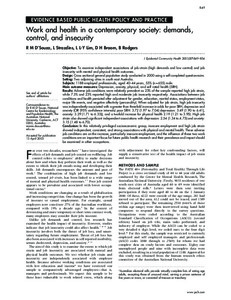Work and health in a contemporary society: demands, control, and insecurity

Strazdins, Lyndall ; Lim, Lin Lean ; Broom, Dorothy H. ; D'Souza, Rennie M. ; Rodgers, B.
Journal of Epidemiology and Community Health
2003
57
11
849-854
labour demand ; mental disorders ; occupation disease relation ; health status ; stress
Occupational safety and health
English
Bibliogr.;[Internet download]
"OBJECTIVE:
To examine independent associations of job strain (high demands and low control) and job insecurity with mental and physical health outcomes.
DESIGN:
Cross sectional general population study conducted in 2000 using a self completed questionnaire.
SETTING:
Two adjoining cities in south east Australia.
SUBJECTS: 1188 employed professionals, aged 40-44 years, 55% (n = 655) male.
MAIN OUTCOME MEASURES:
Depression, anxiety, physical, and self rated health (SRH).
RESULTS: Adverse job conditions were relatively prevalent as 23% of the sample reported high job strain, while 7.3% and 23% reported high and moderate job insecurity respectively. Associations between job conditions and health persisted after adjustment for gender, education, marital status, employment status, major life events, and negative affectivity (personality). When adjusted for job strain, high job insecurity was independently associated with a greater than threefold increase in odds for poor SRH, depression and anxiety (OR (95% confidence intervals) poor SRH: 3.72 (1.97 to 7.04) depression: 3.49 (1.90 to 6.41), anxiety: 3.29 (1.71 to 6.33)), and a twofold increase for physical health 2.19 (1.21 to 3.95). High job strain also showed significant independent associations with depression: 2.54 (1.34 to.4.75) and anxiety: 3.15 (1.48 to 6.70).
CONCLUSION:
In this relatively privileged socioeconomic group, insecure employment and high job strain showed independent, consistent, and strong associations with physical and mental health. These adverse job conditions are on the increase, particularly insecure employment, and the influence of these two work conditions are an important focus for future public health research and their prevalence and impact should be examined in other occupations."
Digital
The ETUI is co-funded by the European Union. Views and opinions expressed are however those of the author(s) only and do not necessarily reflect those of the European Union or the ETUI.